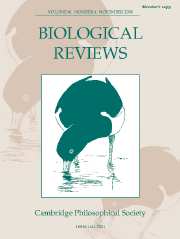Crossref Citations
This article has been cited by the following publications. This list is generated based on data provided by
Crossref.
Krause, J
Hoare, D
Krause, S
Hemelrijk, C K
and
Rubenstein, D I
2000.
Leadership in fish shoals.
Fish and Fisheries,
Vol. 1,
Issue. 1,
p.
82.
Hölker, F.
and
Breckling, B.
2002.
Influence of activity in a heterogeneous environment on the dynamics of fish growth: an individual‐based model of roacl.
Journal of Fish Biology,
Vol. 60,
Issue. 5,
p.
1170.
Castric, V
Bernatchez, L
Belkhir, K
and
Bonhomme, F
2002.
Heterozygote deficiencies in small lacustrine populations of brook charr Salvelinus Fontinalis Mitchill (Pisces, Salmonidae): a test of alternative hypotheses.
Heredity,
Vol. 89,
Issue. 1,
p.
27.
Griffiths, S. W.
and
Armstrong, J. D.
2002.
Kin‐biased territory overlap and food sharing among Atlantic salmon juveniles.
Journal of Animal Ecology,
Vol. 71,
Issue. 3,
p.
480.
Croft, D. P.
Arrowsmith, B. J.
Bielby, J.
Skinner, K.
White, E.
Couzin, I. D.
Magurran, A. E.
Ramnarine, I.
and
Krause, J.
2003.
Mechanisms underlying shoal composition in the Trinidadian guppy, Poecilia reticulata.
Oikos,
Vol. 100,
Issue. 3,
p.
429.
Godin, Jean-Guy J
Alfieri, Michael S
Hoare, Daniel J
and
Sadowski, Jennifer A
2003.
Conspecific familiarity and shoaling preferences in a wild guppy population.
Canadian Journal of Zoology,
Vol. 81,
Issue. 11,
p.
1899.
Hensor, E.M.A.
Godin, J.-G.J.
Hoare, D.J.
and
Krause, J.
2003.
Effects of nutritional state on the shoaling tendency of banded killifish, Fundulus diaphanus, in the field.
Animal Behaviour,
Vol. 65,
Issue. 4,
p.
663.
Griffiths, Siân W
2003.
Learned recognition of conspecifics by fishes.
Fish and Fisheries,
Vol. 4,
Issue. 3,
p.
256.
Hoare, D J
and
Krause, J
2003.
Social organisation, shoal structure and information transfer.
Fish and Fisheries,
Vol. 4,
Issue. 3,
p.
269.
Couzin, Iain D
and
Krause, Jens
2003.
Vol. 32,
Issue. ,
p.
1.
Croft, Darren P
Krause, Jens
Couzin, Iain D
and
Pitcher, Tony J
2003.
When fish shoals meet: outcomes for evolution and fisheries.
Fish and Fisheries,
Vol. 4,
Issue. 2,
p.
138.
Barber, Iain
2003.
Parasites and size‐assortative schooling in three‐spined sticklebacks.
Oikos,
Vol. 101,
Issue. 2,
p.
331.
Svendsen, J. C.
Skov, J.
Bildsoe, M.
and
Steffensen, J. F.
2003.
Intra‐school positional preference and reduced tail beat frequency in trailing positions in schooling roach under experimental conditions.
Journal of Fish Biology,
Vol. 62,
Issue. 4,
p.
834.
Farmer, N. A.
Ribble, D. O.
and
Miller, D. G.
2004.
Influence of familiarity on shoaling behaviour in Texas and blacktail shiners.
Journal of Fish Biology,
Vol. 64,
Issue. 3,
p.
776.
Engeszer, Raymond E
Ryan, Michael J
and
Parichy, David M
2004.
Learned Social Preference in Zebrafish.
Current Biology,
Vol. 14,
Issue. 10,
p.
881.
T. Russell, Stephen
L. Kelley, Jennifer
A. Graves, Jefferson
and
E. Magurran, Anne
2004.
Kin structure and shoal composition dynamics in the guppy,Poecilia reticulata.
Oikos,
Vol. 106,
Issue. 3,
p.
520.
Rosenthal, Gil G.
and
Ryan, Michael J.
2005.
Assortative preferences for stripes in danios.
Animal Behaviour,
Vol. 70,
Issue. 5,
p.
1063.
Hölker, Franz
and
Breckling, Broder
2005.
A spatiotemporal individual-based fish model to investigate emergent properties at the organismal and the population level.
Ecological Modelling,
Vol. 186,
Issue. 4,
p.
406.
Croft, D. P.
James, R.
Ward, A. J. W.
Botham, M. S.
Mawdsley, D.
and
Krause, J.
2005.
Assortative interactions and social networks in fish.
Oecologia,
Vol. 143,
Issue. 2,
p.
211.
Bisazza, Angelo
and
Dadda, Marco
2005.
Enhanced schooling performance in lateralized fishes.
Proceedings of the Royal Society B: Biological Sciences,
Vol. 272,
Issue. 1573,
p.
1677.


